How the shipping industry is managing contemporary challenges
Athena Yiazou 07:12 - 03 September 2023

“Anyone can steer the ship but a leader must chart the course,” as the saying goes, which is why we invited a number of leading Cyprus-based shipping industry chiefs to join the Deputy Minister of Shipping, Marina Hadjimanolis, for an informal gathering at which they could discuss the future of this crucial sector and examine the most significant challenges facing it, both locally and globally.
The setting may have been an informal brunch at the picturesque Petite Plage restaurant in the Limassol tourist area but the issues discussed during the gathering were extremely important ones. As noted by Captain Eberhard Koch, “The shipping industry is not only fighting significant challenges but faces serious threats.”
Deputy Minister Hadjimanolis acknowledged that, “The global and local shipping industry operates in a dynamic environment, subject to changing conditions and occasional global crises,” before stating, “The green transformation, decarbonisation, cybersecurity, digitalisation and geopolitical developments are just some of the challenges that the maritime community has to face, for shipping to continue to play its multidimensional role in the global arena effectively and sustainably.”

Hadjimanolis
Capt. Koch suggested that threats to the industry also included, among others, the level of de-globalisation following the COVID-19 pandemic and its profound negative effects on the supply side, shifting production back. “Never-ending, permanently increasing, stricter regulations, without any suggestion on how to apply them, are another threat to the industry,” he continued. These, he said, included the complexities posed by the Green Transition and decarbonisation of the shipping sector by 2050. “With almost no alternative fuels available, with dual-fuelled ships costing more to build and the price for alternative fuels prohibitive, how will this translate into ships’ earnings and values in the future?” he queried.
As also pointed out by Sunil Kapoor, “It is important to note that decarbonising the maritime sector poses unique challenges, due to the scale and complexity of the industry. The transition to low-carbon technologies and fuels requires significant investment, infrastructure development and international cooperation to ensure a sustainable and efficient shipping industry, while reducing its environmental impact.”
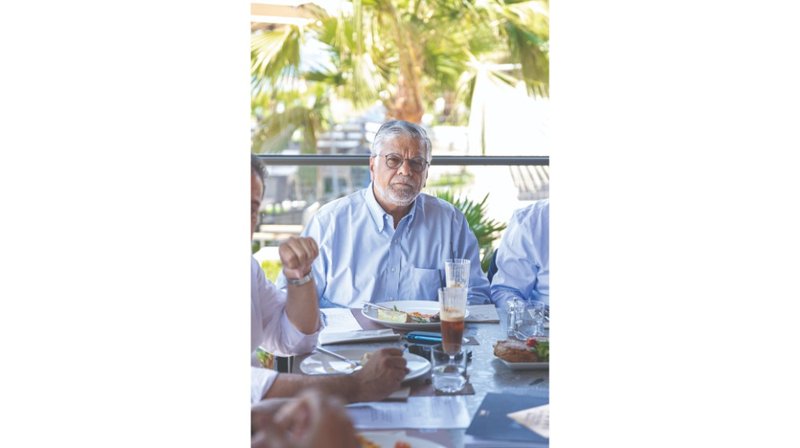
Kapoor
While Dieter Rohdenburg agreed with his peers’ decarbonisation concerns, he also reminded them that time was of the essence.
“The most significant challenge facing the industry is, undoubtedly, decarbonisation and its related legislation. Whilst shipping is one of the most difficult industries to decarbonise, we do not have the luxury to sit back and wait for zero carbon fuels. We have to start now, by taking action to improve our ecological footprint by technical and operational means,” he said.
ALTERNATIVE FUELS
George Mouskas proposed that one of the reasons why decarbonisation consititutes a major problem was, “Because when they are building ships, ship-owners do not know what type of fuel to specify.”
He continued, “No-one has determined the fuel of the future, whether it will be, example, methanol or hydrogen, so we are forced to order ships that burn fuel oil as there is no alternative. Also, setting up the infrastructure for new fuels may take 20 years. All we can do is order ships that are as economical as possible to lower the emissions.”
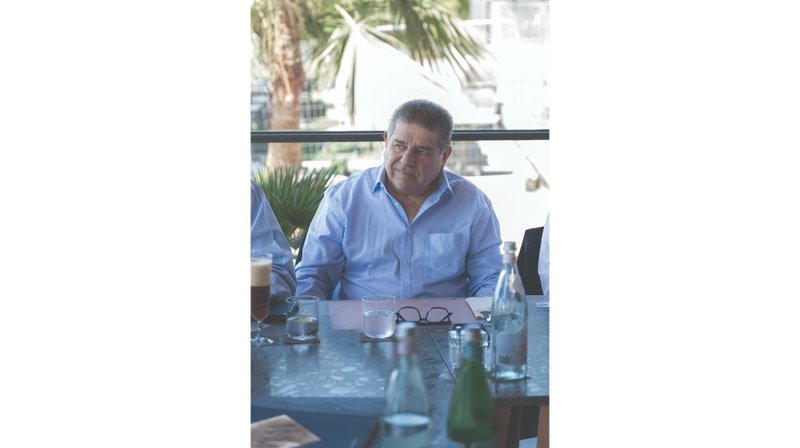
Mouskas
Sunil Kapoor noted the growing interest in exploring alternative fuels to replace traditional marine fuels like heavy fuel oil. “LNG is being increasingly used as a cleaner alternative, as it emits fewer pollutants and reduces greenhouse gas emissions compared to conventional fuels. However, there are now concerns about methane slip and, all of a sudden, this might not be acceptable going forward. Additionally, biofuels, hydrogen and ammonia are being considered for use in the maritime industry, although their adoption is still in the early stages,” Kapoor noted, before pointing out that, while a number of countries were pushing to use ammonia, “a major concern is that ammonia is quite toxic and corrosive in nature. The challenge will be how to use it safely onboard vessels,” he explained.
Rohdenburg noted that progress was being made in the development of alternative fuels, “in some areas faster than expected,” but added that, “To reach our goals, the existing fleet needs to be optimised – by improved operations and by technical means. The Carbon Intensity Indicator (CII), whilst being poorly worded, is a concept that requires commercial and technical operators to work together to reduce the CO2 footprint.”
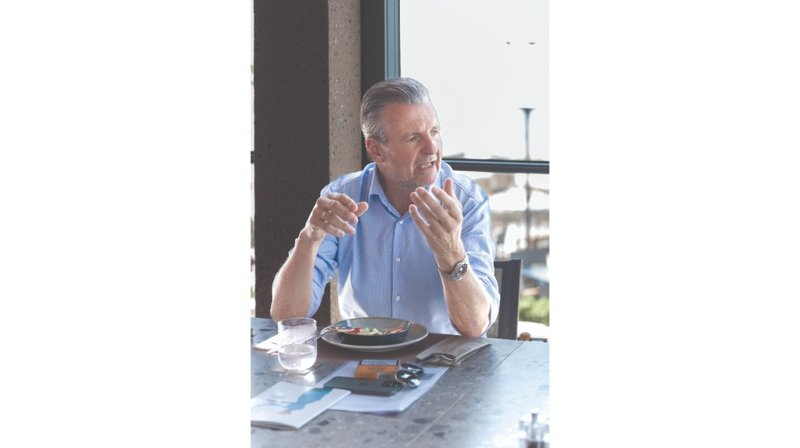
Rohdenburg
Andreas Hadjipetrou said that, while challenges remain, efforts towards decarbonisation and alternative fuels in the shipping industry are progressing, and he suggested that cooperation is key.
“The industry is actively engaged in research and development to deploy zero-carbon technologies such as green hydrogen, ammonia, fuel cells, batteries and synthetic fuels. While short-term measures have been implemented to improve energy efficiency, achieving full decarbonisation requires global cooperation and the development of scalable zero-carbon technologies for large ships,” he said.
The Deputy Minister also displayed a positive view on the decarbonization issue, noting that efforts had been “progressing steadily.” She recalled that Cyprus had introduced a ‘green incentives’ scheme to reward companies that effectively reduce emissions beyond the agreed global levels. These incentives aim to encourage the adoption of environmentally friendly practices and technologies in the maritime sector.
“In terms of alternative fuels, Cyprus recognises their importance and actively supports their adoption. Biofuels and other low or zero-emission fuels are already being used on ships flying the Cyprus flag and many vessels have undergone sea trials using these fuels. Alternative fuels are expected to be available worldwide in the coming years, as technology continues to evolve and renewable energy sources advance,” Hadjimanolis told the gathering.
EDUCATION
She also noted that, to further drive the green transformation, Cyprus had established the Research Innovation Shipping Environment (RISE) to fund research and innovation projects focused on greening the shipping industry. “Additionally, the country provides e-education, e-training and e-learning programmes to keep stakeholders informed about the latest updates at EU and IMO levels,” the Deputy Minster underlined.
For George Mouskas, meanwhile, the most challenging problems for shipping today also include finding good, competent crew. “We need to attract young men and women to the industry by showing them the advantages of being a seaman or woman and the high earnings that are available today,” he suggested. Capt. Koch agreed that the ongoing ship officer supply shortage “with a 9 % gap in the global pool” was of concern.
Voicing his own concerns, Andreas Hadjipetrou suggested that the industry’s best approach would be to see challenges as opportunities for positive change.
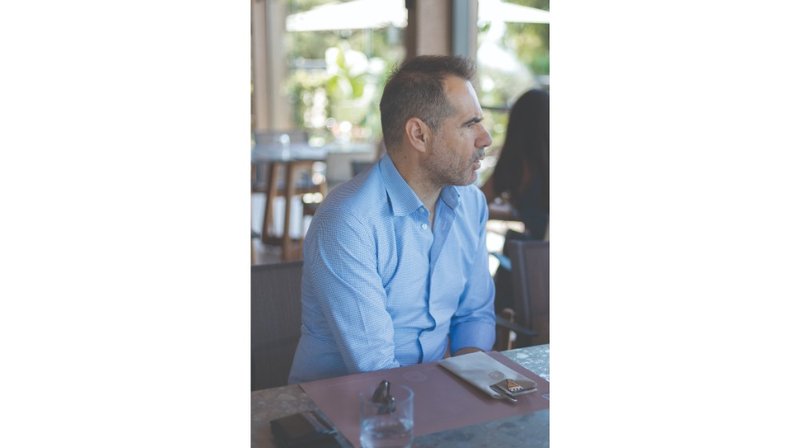
Hadjipetrou
“The industry is being asked to adapt to new fuel requirements, increase its preparedness for sustainability demands, and navigate the complexities of international regulations and policies. But every challenge is an opportunity to improve, shape your service accordingly and develop partnerships that enable growth and facilitate change,” he said. He went on to underline that, “Collaboration among all key stakeholders is crucial, along with setting targets for environmental improvements, investing in safety measures and embracing digital technologies for improved efficiency and resilience.”
TECHNOLOGY
So, what did the industry leaders have to say about the impact of technology on the shipping sector and how do they see its growing role in the coming years?
As stated by Deputy Minister Hadjimanolis, “In terms of efficiency and cost reduction, technology has revolutionised operations in the shipping industry, enabling faster and streamlined processes, optimised routing and real-time tracking systems. These advancements minimise delays and optimise resource allocation, ultimately reducing costs.”
She also noted that that safety and security in the shipping sector have significantly improved through the implementation of advanced technologies such as navigation systems, collision avoidance tools, surveillance systems and access control measures. She suggested that technology also plays a crucial role in promoting sustainability in the industry. “The adoption of energy-efficient propulsion systems, alternative fuels, emissions monitoring systems and digital optimisation tools helps minimise the industry’s environmental footprint and optimise fuel consumption,” she said.
The Deputy Minister also mentioned autonomous ships and remote operation technologies, as well as the ongoing digital transformation in the shipping sector integrating technologies like blockchain and Internet of Things (IoT) to improve supply chain management, enhance transparency and enable real-time data exchange as examples of the progress created by technology. But she warned that, “The growing reliance on technology also brings cybersecurity challenges. Protecting sensitive data and ensuring the integrity of digital infrastructure are critical concerns that require ongoing investment in cybersecurity measures and robust protocols.”
Capt. Eberhard Koch agreed. “Technology is reshaping the maritime industry,” he said, “but if new technologies are brought onboard, the education of officers also has to be changed accordingly. Today’s seafarers must be given the opportunity to prepare for the challenges of decarbonisation and digitalisation,” he explained.

Capt. Koch
For Dieter Rohdenburg, technology and digitalisation will be strong drivers in the reduction of emissions from ships. “New technology, particularly in the propulsion space, will eventually allow the use of zero carbon fuels like ammonia and hydrogen, while digitalisation will help optimise shipboard and commercial operations.”
AI, AUTOMATION & ROBOTICS
Sunil Kapoor turned the participants’ attention to the issues of
AI, automation and robotics. “Automation has revolutionised various aspects of the shipping industry, particularly in port operations. Automated cranes, guided vehicles and robotic systems have improved efficiency, reduced labour costs and increased safety. In the future, we can expect to see further advancements in autonomous ships, drone deliveries, and robotic maintenance systems,” he noted.
He also pointed out that Artificial Intelligence (AI) was already being used without any significant problems in a quite a number of areas. “By reviewing routes and navigational patterns, AI can navigate vessels without human intervention, opening up the possibility of autonomous ships or those with minimal crew. This will allow deckhands to focus on other essential tasks on the ship, ensuring safe cargo delivery and increased efficiency,” he explained. IoT technology, meanwhile, has enabled the integration of sensors and devices throughout the shipping supply chain. “This allows for real-time tracking and monitoring of cargo, vessels and containers. IoT enables better fleet management, optimisation of routes and improved visibility, leading to more efficient operations and reduced costs,” Kapoor pointed out. “Additionally, Big Data analytics helps shipping companies optimise their operations, predict maintenance needs and take data-driven decisions. It also enables improved supply chain management, risk assessment, and route optimisation, resulting in cost savings and increased efficiency,” he added, before referring to 3D printing, which, although still in its early stages, has the potential to disrupt traditional supply chains in the shipping industry. “In remote areas or during emergencies, 3D printing can be a game-changer for obtaining critical supplies,” Kapoor noted.
Andreas Hadjipetrou agreed that technology has led to tremendous advances in the maritime industry, influencing many aspects, including seafarer training and sustainability as well as making vessel management and operational processes more efficient.
“It has increased operating efficiency and safety in the current landscape through the installation of modern navigational systems and real-time monitoring and communication tools,” he said, adding, “Through digital platforms and data analytics, it has also supported improved logistics and supply chain management, allowing for greater coordination and efficiency of shipping operations. Looking ahead, technological advancements are projected to continue to play a crucial role in the shipping industry. These innovations are expected to transform the sector by increasing production, lowering prices, and resolving environmental problems. It is crucial to emphasise the importance of empowering people with advanced tools and systems to drive innovation, sustainability and effectiveness in the shipping sector.”
George Mouskas was in agreement on the importance of the human element.
“While today’s ships have more technology to help those on board,” he said, “replacing crew with computers is not an option. Ships require maintenance at sea, especially if there is a mechanical breakdown, say, while in the middle of a Pacific Ocean crossing or anywhere remote.”
The evident expertise and forward-thinking approach of the shipping sector leaders at the gathering in Limassol, suggest clearly that, for all the challenges, in their hands the sector will continue to thrive.
WHO’S WHO
Marina Hadjimanolis (Deputy Minister of Shipping)
Capt. Eberhard Koch (Chairman, CEO & Partner, ÖL Shipping Group)
Dieter Rohdenburg (CEO, Intership Navigation Co Ltd)
Sunil Kapoor (Director, FML Ship Management Ltd)
George Mouskas (President, Olympia Ocean Carriers Ltd)
Andreas Hadjipetrou (Managing Director & Group CCO, CSM)
Stephanos Kassianides (General Manager, International Business Banking, Eurobank Cyprus)
Constantinos Milios (Head of Shipping Finance, Eurobank Cyprus)
Elena Stephanidou Antoniadou (Manager Kolonakiou Banking Center, Eurobank
Cyprus)
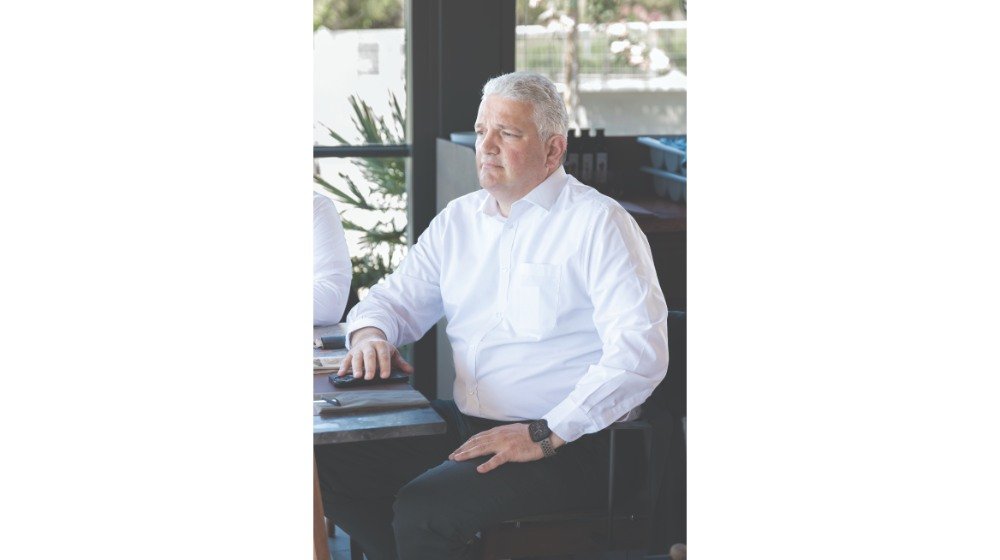
Kassianides
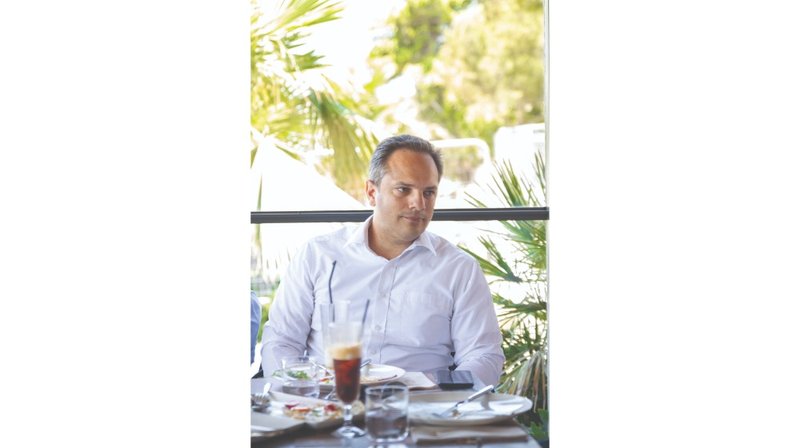
Milios

Stephanidou Antoniadou
(Photos by Giorgos Charal)
This interview first appeared in the 2023 edition of The Cyprus Journal of Wealth Management. Click here to view it.

